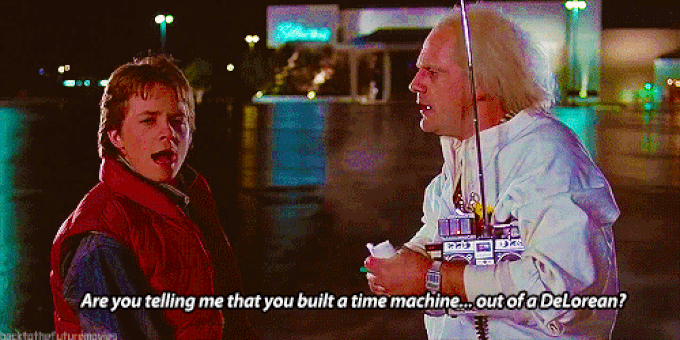I have always thought of time travel as the Santa Claus of science; I want to believe it is real, but I know deep down, that I am terribly mistaken. Or am I? After watching movies like Back to the Future, Hot Tub Time Machine, Looper, Click, Men in Black 3, Austin Powers in Goldmember, Groundhog Day, Escape from the Planet of the Apes, and Interstellar, I have trained myself to believe that time travel is too good to be true, but maybe these movies had some substance to them.
For about the last one hundred years, scientists have slowly realized what it would take to travel through time. To move forward in time, one would have to move faster than the speed of light, which is 299,792,458 m/s. I know, such a large number can be hard to comprehend. In order to move as fast as the speed of light, one would need to go around the Earth 7.5 times in just one second. This is yet another example of how humans have terrible intuition, as it is impossible to even imagine being able to go around the Earth that many times in one second. Although scientists have many theories on the matter, the basic laws of science established many years ago support that objects traveling faster than the speed of light would be impossible.
In 1916, Albert Einstein’s general theory of relativity claims that it would be impossible to move an object at the speed of light for two reasons. First of all, the faster an object goes, the more mass it accumulates. This is shown through Einstein’s famous equation, E=mc^2. C equals the speed of light and is therefore constant. Since an object must gain an enormous amount of energy to travel at the speed of light, the object’s mass must increase as well. As a result, an object would need infinite mass to travel at the speed of light, making the proposition impossible. Additionally, if an object were to go as fast as the speed of light, the warped length and time intervals would make the length of the object 0, which would also make this endeavor impossible.
However, numerous experiments have been conducted which suggest that time travel into the future might be possible. For instance, in 1975, Carol Allie used two synchronized atomic clocks, which are extremely accurate and precise, to show that time moves more slowly when you are moving faster. Allie repeatedly flew a plane around for hours with one atomic clock on the plane and the other on the ground. Consistently, the results showed that the clock on the plane was a fraction of a second slower. This slowing of time due to motion is called time dilation. Furthermore, scientists have placed atomic clocks on the top and bottom of skyscrapers to see if the mass of the earth would affect time. The results showed that the clocks on the ground, closer to the Earth’s mass, were slightly slower than the clocks placed at the top of the skyscraper.
Although there is evidence that traveling into the future is possible, traveling back in time is a completely different challenge. One way someone could accomplish this would be to travel faster than the speed of light, which is thought to be impossible. Even if it wasn’t, we don’t have the resources to build such a machine, or even anything somewhat close. Another way would be through a wormhole to use as a shortcut back in time, yet to this day, there is no proof that wormholes even exist. Furthermore, there are many problems with the idea of time travel into the past. The grandfather paradox, proposed by Nathaniel Shachner in 1933, wonders how someone could travel back in time and shoot their grandfather. How could this grandfather get killed by his grandchild if the grandchild should not be born since the grandfather had died before he could have kids.
Clearly, experiments, as of now, are impossible to perform at large scales that could actually provide evidence of significant time travel because we do not possess the resources or energy to do so. However, on minute scales, time travel into the future has been proven possible. In my opinion, not in my lifetime, not in my children’s lifetimes, but in a few hundred years, people might be able to create the technology and harness enough energy in order to travel a few minutes into the future. But hey, who knows? I bet people of the 1700s never could have imagined the technology that the 21st century possesses. Maybe humans will surprise themselves.




Wow, I must say this is an extremely well written blog post. Not only did it keep me interested but I also leaned many things about the speed of light. Time travel is possibly one of the most interesting and controversial topics of today; time travel would have unimaginable positive consequences, but also negative ones. Personally, I do not believe it would be ever possible to travel back in time. I believe this for the exact reason you mentioned in your post: it would not be logically possible for someone to go back in time and kill their ancestor. However, travel into the future does seem more possible. But honestly, now that I think of it, I do not believe it is possible. The future has yet to happen and therefore it does not exist… If it does not exist then what would we be traveling into. The world is made up of billions of individual people acting with self-interest, it is possible to assume how things will play out and what the future will hold. Since there is not a future that already exists, I do not believe it possible to travel into the future.
Here is an article that explains a way NASA possible travel faster than light.